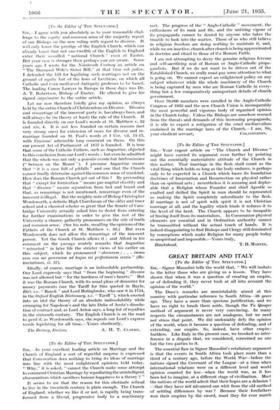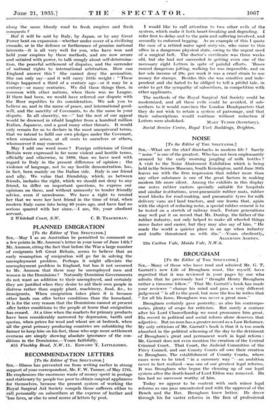GREAT BRITAIN AND ITALY
[To the Editor of TILE SPECTATOR.] SIR,—Signor Mussolini tells the world that, " We will imitate to the letter those who are giving us a lesson. They have shown that when it was a question of creating an empire, or of defending it, they never took at all into account the opinion of the world."
The Duce's remarks are unmistakably aimed at this country with particular reference to South Africa-36 years ago. They have a more than specious justification, and we have no right to brush them aside, though the Tu Quoque method of argument is never very convincing. In many respects the circumstances are not analogous, but we need not stress that point. We did undeniably defy the opinion of the world, when it became a question of defending, and of extending, our empire. So, indeed, have other empire- builders. Like Italy in the present case, we brooked no inter- ference in a dispute that, we considered, concerned no one but the two parties to it.
The essential flaw in Signor Mussolini's retaliatory argument
is that the events in South Africa took place more than a third of a century ago, before the World War—before the nations signed the Covenant of the League—at a time when international relations were on a different level and world opinion counted for less—when the world was, as it has been led to imagine, at a different stage of civilization. Must the nations of the world admit that their hopes are a delusion ? —that they have nOt. advanced one whit from the old method of settling differences by war ? Because their forefathers won their empires by the sword, must they Air ever march
along the same bloody road to fresh empires and fresh conquests ?
But it will be said by Italy, by Japan, or by any Great Power bent on expansion—whether under cover of a civilizing crusade, or in the defence or furtherance of genuine national interests—it is all very well for you, who have won and held your empires by these methods, and are now secure and satiated with power, to talk smugly about self-determina- tion, the peaceful settlement of disputes, and the surrender of national rights to international arbitration. How can England answer this ? She cannot deny the accusation. She can only say—and it will carry little weight : " These things happened a third of a century ago—or it may be a century—or many centuries. We did these things then, in common with other nations, when there was no League. If there had been, we would have referred our dispute with the Boer republics to its consideration. We ask you to believe us, and in the name of peace, and international good- will, and the sanctity of Covenants, to do the same in your dispute. In all sincerity, we—" but the rest of our appeal would be drowned in ribald laughter from a hundred million Italian, Japanese, and a good many other throats. It would only remain for us to declare in the most unequivocal terms, that we intend to fulfil our own pledges under the Covenant, when occasion arises, at all costs to ourselves or others, whomsoever it may concern.
May I add one word more ? Foreign criticisms of Great Britain were expressed in far more violent and hostile terms, officially and otherwise, in 1899, than we have used with regard to Italy in the present difference of opinion ; the violence of language, not to say hostile demonstration, has, in fact, been mainly on the Italian side. Italy is our friend and ally. We value that friendship, which, as between friends, includes the right, which we should not deny to any friend, to differ on important questions, to express our opinions on them, and without animosity' to tender friendly advice, even if unwelcome. We have a right to remind her that we were her best friend in the time of trial, when modern Italy came into being 80 years ago, and have had no serious quarrel with her since.—I am, Sir, your obedient servant,









































 Previous page
Previous page